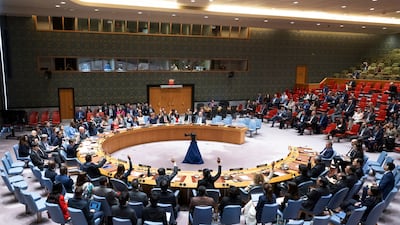Ordinarily, news of a UN Security Council resolution calling for an immediate halt to a war and backing a viable peace plan would be greeted with relief. This would be particularly true for a conflict as brutal as the one in Gaza, where reports of Israeli military massacres, mass graves and starving civilians emerge almost daily. But the global reaction to the news coming out of New York has been muted, to say the least. There is little sense that a halt to the violence is imminent. On the contrary, the suffering goes on, including that of the remaining Israeli hostages and Palestinian prisoners of war
When it comes to Gaza there are two parallel worlds: what’s discussed behind closed doors by diplomats and mediators, and the brutal realities on the ground. Nevertheless, with the war entering its ninth month, US President Joe Biden’s three-phase ceasefire plan remains the only initiative his government, Israel’s main backer, supports – and that quality alone might lend it an air of achievability. It is not perfect, but it is something to work with.
Nonetheless, questions remain and, if the proposal is to be converted into concrete action, they cannot be ignored for long. Key among these is whether Israel is truly on board with Mr Biden’s plan. According to the text of the resolution, Israel has already accepted the terms. They include, as Mr Biden described them in a speech on May 31, a ceasefire pending negotiations for at least six weeks, during which time mediators would help secure the release of “a number of hostages”, Israeli forces would withdraw from populated areas and Palestinian civilians would receive aid. Successful negotiations, covering “a number of details”, would enable a move to phase two, which is a “cessation of hostilities permanently”.
But in the Security Council chamber on Monday, Israel’s representative to the UN, Reut Shapir Ben Naftaly, said the war would continue “until all of the hostages are returned and until Hamas’ military and governing capabilities are dismantled”.
This runs counter to Mr Biden’s speech, which made no mention of eradicating Hamas. Mr Biden instead said Israel had already “devastated Hamas forces”, leaving the militants unable to carry out another October 7-type attack. He went on to say an “indefinite war in pursuit of an unidentified notion of ‘total victory’” would not secure the release of Israeli hostages, nor bring “an enduring defeat of Hamas”.
Questions also remain about the enforcement of this Security Council resolution. The Council’s resolutions are legally binding, but that means little if its members are unwilling to give force to their demands through sanctions or other punitive measures. It has become routine for countries, including Israel, to ignore the Council’s resolutions without consequence. Although the UN remains an invaluable global institution, the distance between its processes and the reality playing out in conflict zones such as Gaza appears only to be growing. Without an effective implementation mechanism, the value of UN resolutions is reduced dramatically.
Indeed, in this other parallel world of violence and displacement, priorities are very different. Yesterday saw a major international conference take place in Jordan, focused on dealing with Gaza’s immense humanitarian catastrophe, where more than 200 people lost their lives in just one night during the Israeli raid to rescue four hostages. Meanwhile, hunger continues to stalk the land as the World Food Programme said it would halt deliveries that rely on a US-built pier on security grounds.
As this catastrophe plays out, and Israel’s political leadership appears to be in disarray, the need for diplomatic solutions has never been greater. But at some point, these parallel worlds will have to come together.


